What Happened to Heights Crematory in Chicago Heights
Heights Crematory in Chicago Heights was permanently shut down in June 2025 by Illinois State Comptroller Susana Mendoza following a state investigation that uncovered disturbing violations in how human remains were handled.
Key Facts About the Closure:
- License Status: Permanently revoked on June 19, 2025
- Bodies Found: Over 100 improperly stored in broken refrigerated trailers
- Cremated Remains: 504 sets transferred to Cook County Medical Examiner
- Location: 230 E 11th St, Chicago Heights, IL 60411
- Cause: Gross malpractice, improper storage, and documentation failures
The investigation began after whistleblowers from the Illinois Funeral Directors Association provided photos showing bodies stacked on top of each other in inoperable refrigeration units. State auditors found an additional concealed trailer containing 19 bodies from Indiana that facility owners had hidden from inspectors.
"I wouldn't trust these people, literally, with my pet," Comptroller Mendoza stated, comparing the undignified treatment of human remains to how her own pet received better care in death.
Families affected by the closure can retrieve cremated remains by emailing MEOfamilyservices@cookcountyil.gov and scheduling an appointment at the Cook County Medical Examiner's Office between 7 a.m. and 3 p.m., Monday through Friday.
As specialists at American Mortuary Coolers with years of experience supplying proper refrigeration equipment to funeral facilities, we've seen how critical proper body storage is to maintaining dignity and regulatory compliance - something Heights Crematory in Chicago Heights clearly failed to achieve.
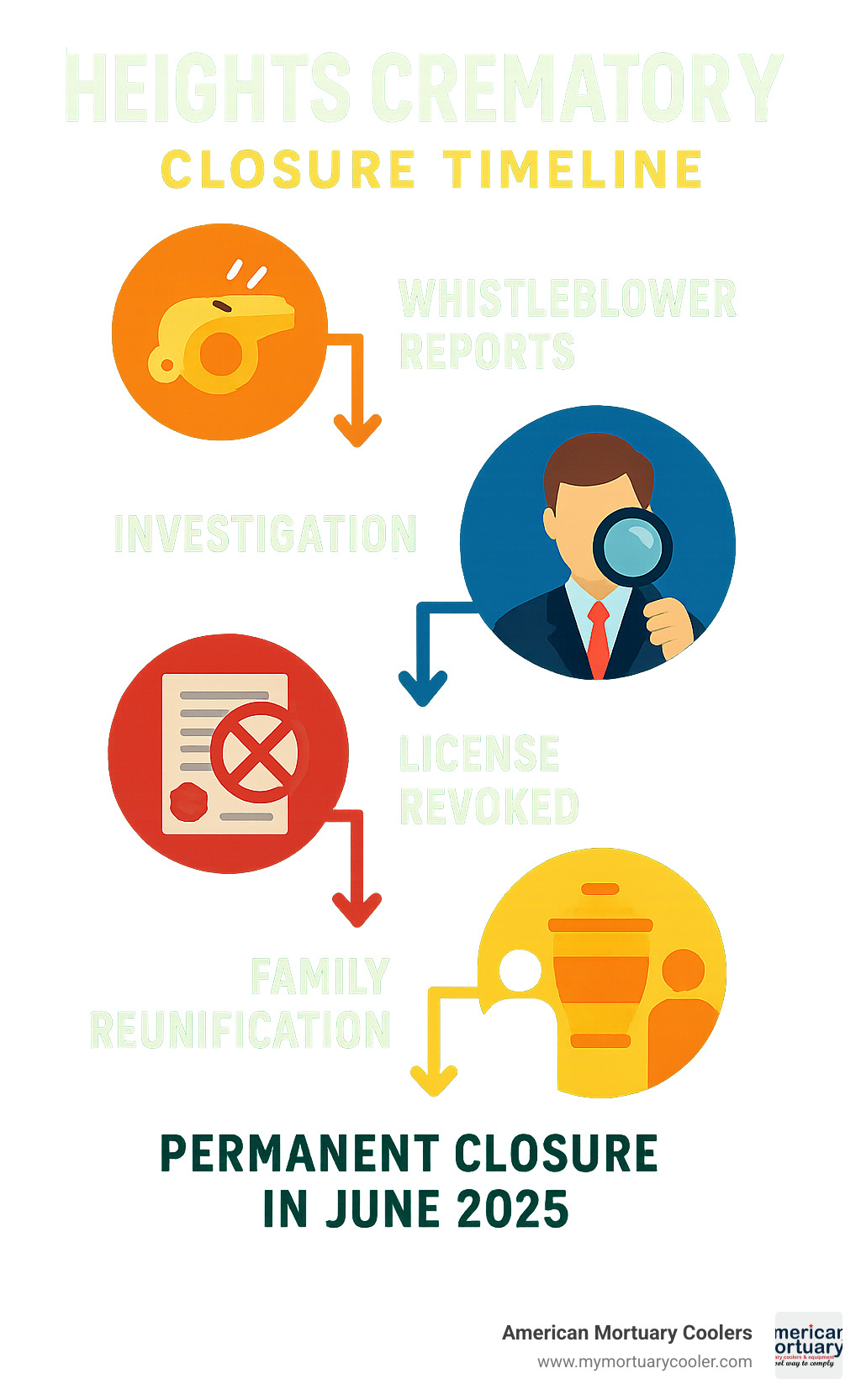
Heights Crematory in Chicago Heights vocab to learn:
Inside Heights Crematory in Chicago Heights: History and Operations
Heights Crematory in Chicago Heights operated from its location at 230 E 11th St as what appeared to be a standard cremation facility serving funeral homes across the Chicago area and parts of Indiana. The facility's business model centered around partnerships with multiple funeral homes throughout the region.
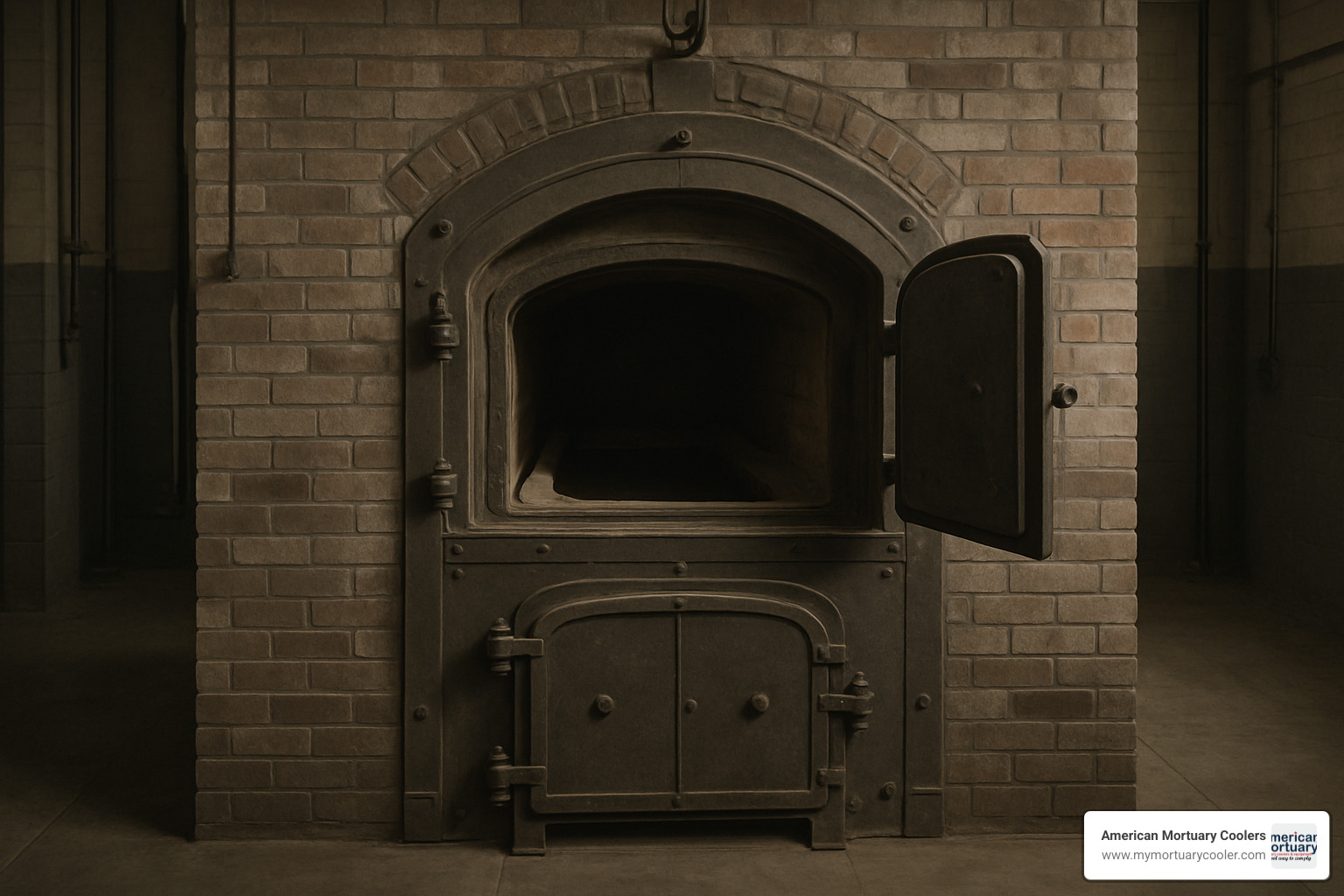
But as investigators would later find, the reality behind the scenes was far different from what families and funeral directors expected. While legitimate crematories invest in professional-grade equipment and follow strict protocols, Heights Crematory cut corners in ways that would shock even seasoned industry professionals.
The facility's capacity issues became apparent when state inspectors found bodies stored in makeshift conditions rather than proper mortuary coolers. For those wanting to understand how cremation should be conducted, the Retort Cremation 101: Understanding the Cremation Process provides essential knowledge about proper cremation procedures and equipment.
Why was Heights Crematory in Chicago Heights Shut Down?
The permanent closure of Heights Crematory in Chicago Heights happened because Illinois State Comptroller Susana Mendoza had seen enough. On June 19, 2025, she issued a consent order that permanently revoked the facility's license - the first time Illinois had ever taken such drastic action against a crematory.
This wasn't the facility's first brush with trouble. Back in 2024, state inspectors had already found disturbing conditions during routine visits. They found "a cadaver in a broken refrigerator" and "six to seven bodies waiting to be cremated on main floor."
The final investigation revealed problems that went far beyond simple maintenance issues. Inspectors found inoperable refrigerated trailers being used to store human remains, bodies stored without proper containers, and a complete lack of required documentation. The breaking point came when auditors found that facility owners had been concealing additional storage units from state inspectors.
How Many Remains Were Affected at Heights Crematory in Chicago Heights?
When state auditors finished their investigation, they found over 100 bodies that had been improperly stored throughout the facility. The Cook County Medical Examiner's Office had to take custody of 504 sets of cremated remains that had never been returned to families.
The documentation was so poor that 10 bodies became completely untraceable. The cleanup required coordination between multiple agencies to sort through the mess and try to reunite families with their loved ones' remains.
The Investigation: From Whistleblower Photos to Permanent Closure
The shocking truth about Heights Crematory in Chicago Heights came to light thanks to courageous whistleblowers from the Illinois Funeral Directors Association. The images showed bodies literally stacked on top of each other inside broken refrigerated trailers.
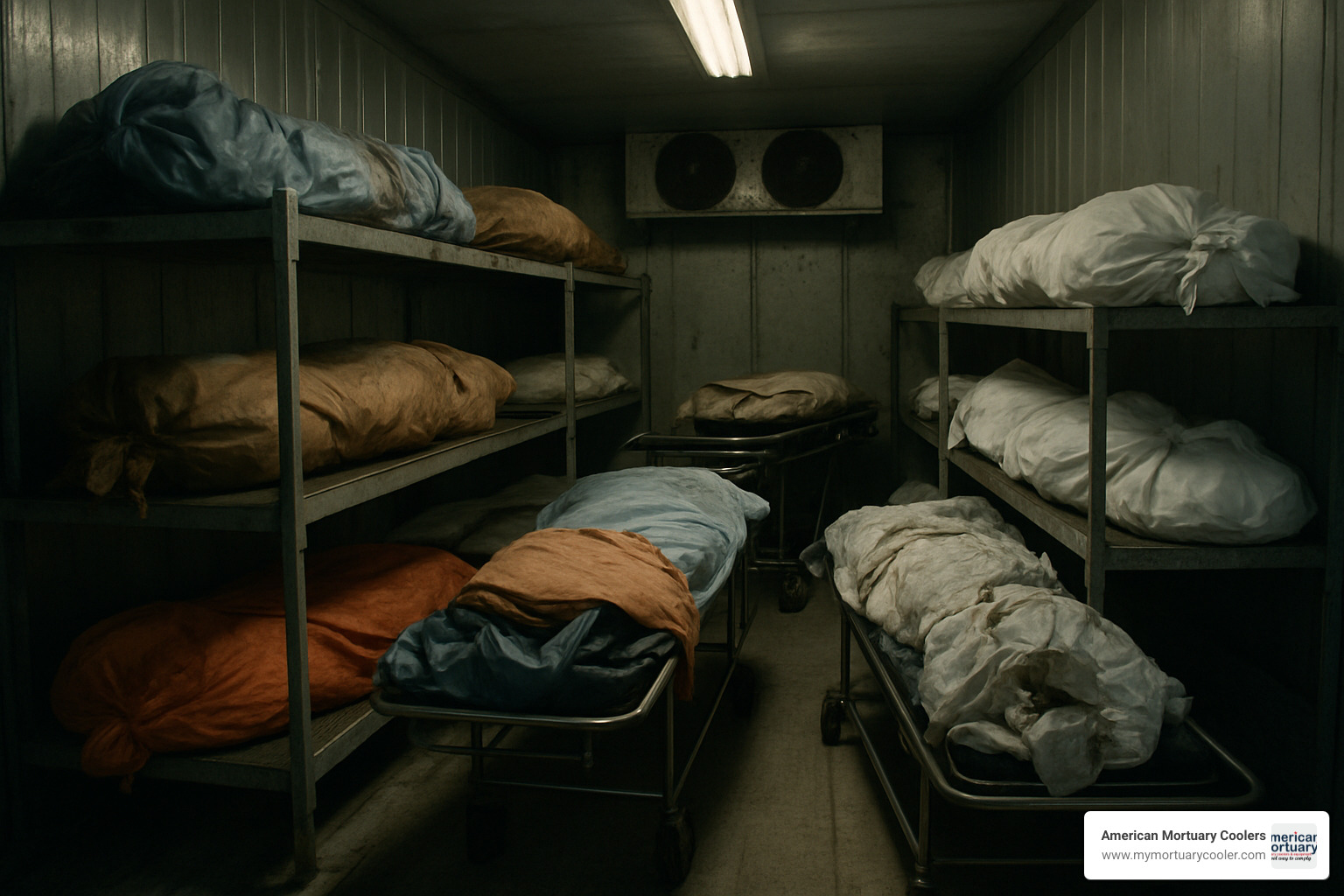
When state auditors arrived to investigate, they found that Heights management had been deliberately deceptive. The facility owners had concealed an additional refrigerated trailer containing 19 bodies from Indiana - hiding it from inspectors in a calculated attempt to cover up the full scope of their violations.
The scientific research on whistleblower protections demonstrates how vital these brave individuals are in exposing institutional failures. Without their willingness to speak up, families might never have known the truth about how their loved ones were treated.
Key Violations and Improper Practices
The investigation revealed a systematic breakdown of every basic standard that crematories must follow. Storage violations included bodies kept in completely inoperable refrigerated trailers and coolers, with remains stacked without proper separation or containers.
The documentation failures were equally troubling. Heights Crematory lacked proper chain-of-custody records, missing required permits and authorizations. Without adequate tracking systems, they couldn't account for remains from intake through final disposition.
Perhaps most disturbing were the operational misconduct patterns. The facility continued accepting new remains even when they clearly lacked storage capacity, concealed storage units from state inspectors, and failed to deliver over 500 boxes of cremated remains to grieving families.
| Illinois Crematory Standards | Heights Crematory Violations |
|---|---|
| Functional refrigeration required | Used broken coolers and trailers |
| Proper documentation mandatory | Missing permits and records |
| Dignified storage protocols | Bodies stacked without containers |
| Timely delivery of remains | 500+ boxes never delivered |
| Transparent operations | Concealed trailer from inspectors |
Legal Actions and Lawsuits
The human cost of these failures became clear as multiple civil lawsuits emerged. Families found they had received cremated remains that didn't belong to their deceased relatives.
The CBS News investigation brought national attention to the case. A hearing originally scheduled for June 24, 2025, was canceled after Heights Crematory in Chicago Heights agreed to permanent closure through the consent order.
Impact on Families and the Community
The permanent closure of Heights Crematory in Chicago Heights sent shockwaves through hundreds of families who had trusted the facility with their most precious final responsibility. Many families found they might have received the wrong cremated remains entirely. Others learned their family members were among the hundreds of unclaimed boxes sitting forgotten in storage.
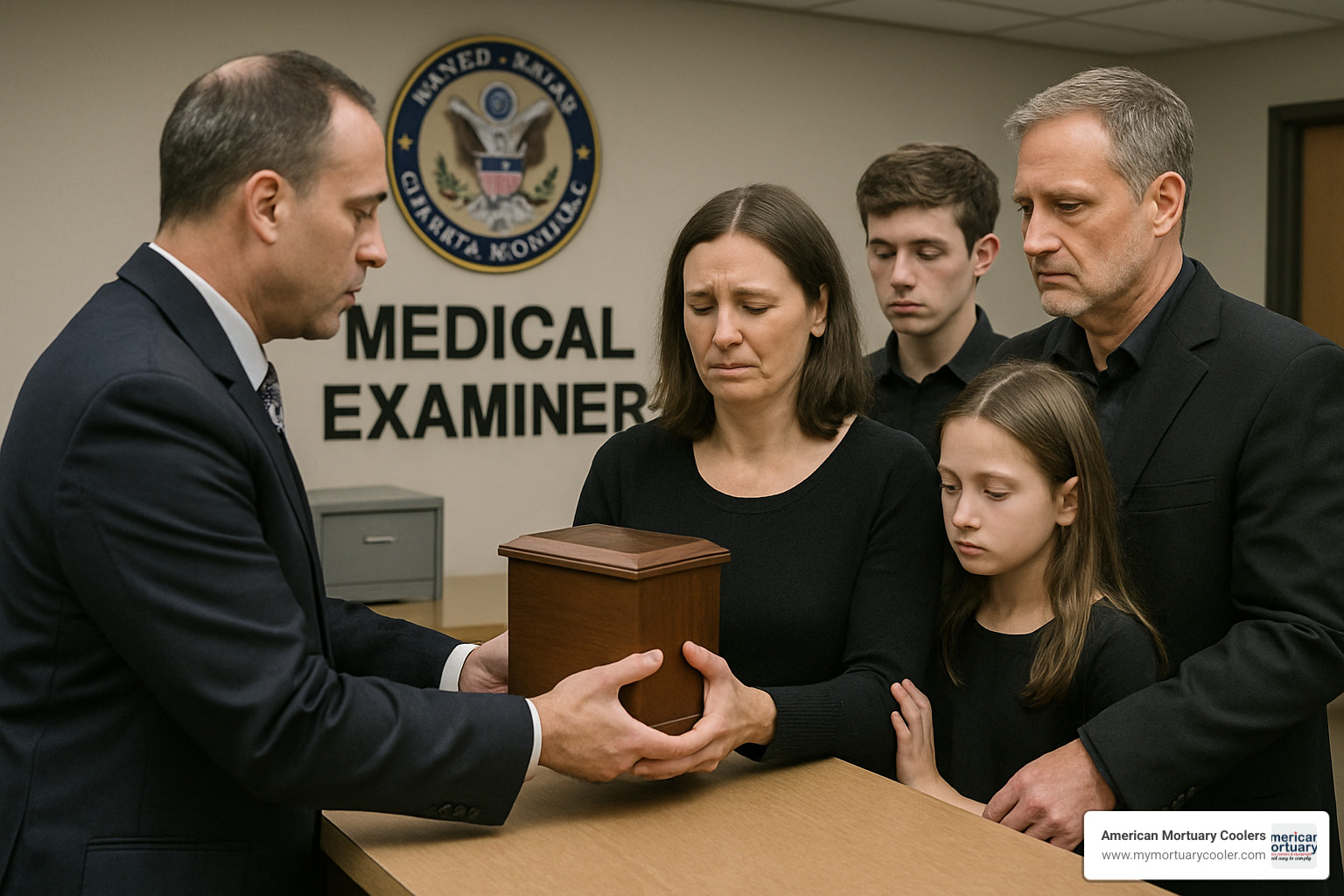
Comptroller Mendoza captured the gravity of this betrayal when she said families' loved ones received less dignified treatment than her own pet dog. The ripple effects spread far beyond grieving families, with funeral directors who had partnered with Heights feeling betrayed and community members questioning whether they could trust other local death care providers.
Reuniting Families with Cremated Remains
The Cook County Medical Examiner's Office stepped in to help families steer the complex process of retrieving their loved ones' remains from Heights Crematory in Chicago Heights.
The pickup process requires families to email MEOfamilyservices@cookcountyil.gov first to schedule an appointment. Appointments run Monday through Friday from 7 a.m. to 3 p.m. at the Medical Examiner's Office located at 2121 W. Harrison St. in Chicago.
Families must bring valid photo identification and complete an Authorization for Release of Cremated Remains form. The Medical Examiner's Office warned that this process might cause additional emotional distress.
Broader Implications for the Funeral Industry
The Heights Crematory in Chicago Heights case changed the landscape of crematory regulation in Illinois. For the first time, state regulators demonstrated they could permanently shut down a crematory through a consent order - no lengthy court battles, just immediate closure.
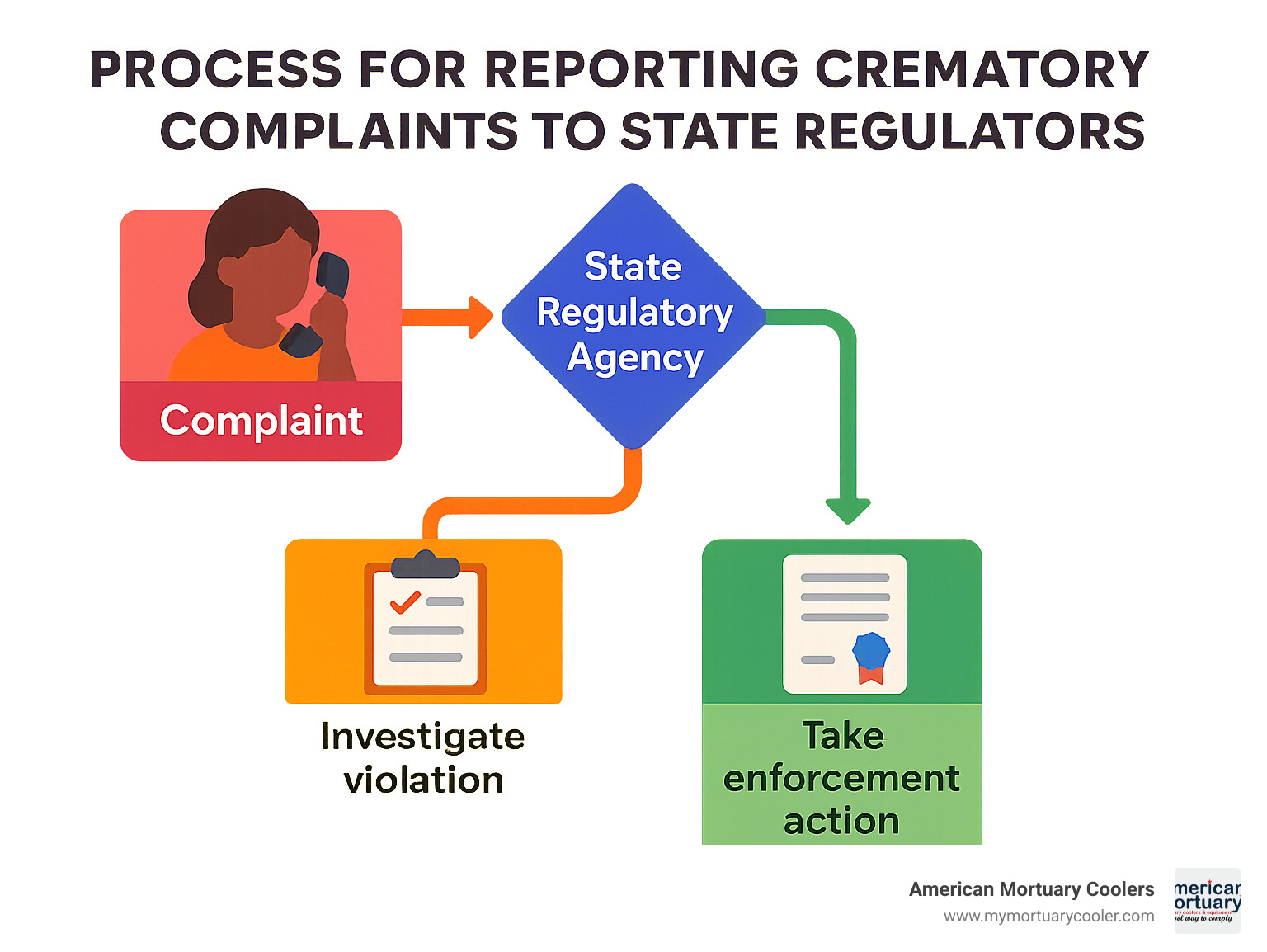
The case also highlighted something encouraging - industry self-policing actually works. It wasn't state inspectors who first found the violations. Instead, funeral directors from the Illinois Funeral Directors Association saw problems and spoke up, reinforcing why professional associations matter so much in death care.
Staying Safe: Illinois Crematory Regulations & How to Choose a Provider
After witnessing the devastating failures at Heights Crematory in Chicago Heights, families deserve to know how to protect themselves when choosing cremation services. Illinois has comprehensive regulations designed to prevent exactly these kinds of violations - when facilities actually follow them.
Illinois crematories must maintain active state licenses and follow strict rules about handling human remains. These requirements include proper refrigeration of bodies before cremation, complete documentation throughout the process, and timely delivery of cremated remains to families.
Understanding The Role of Cremation Retorts in the Cremation Process can help families ask informed questions about a facility's equipment and procedures. Proper body storage requires professional-grade refrigeration systems - not the broken trailers and coolers that caused so much suffering at Heights Crematory.
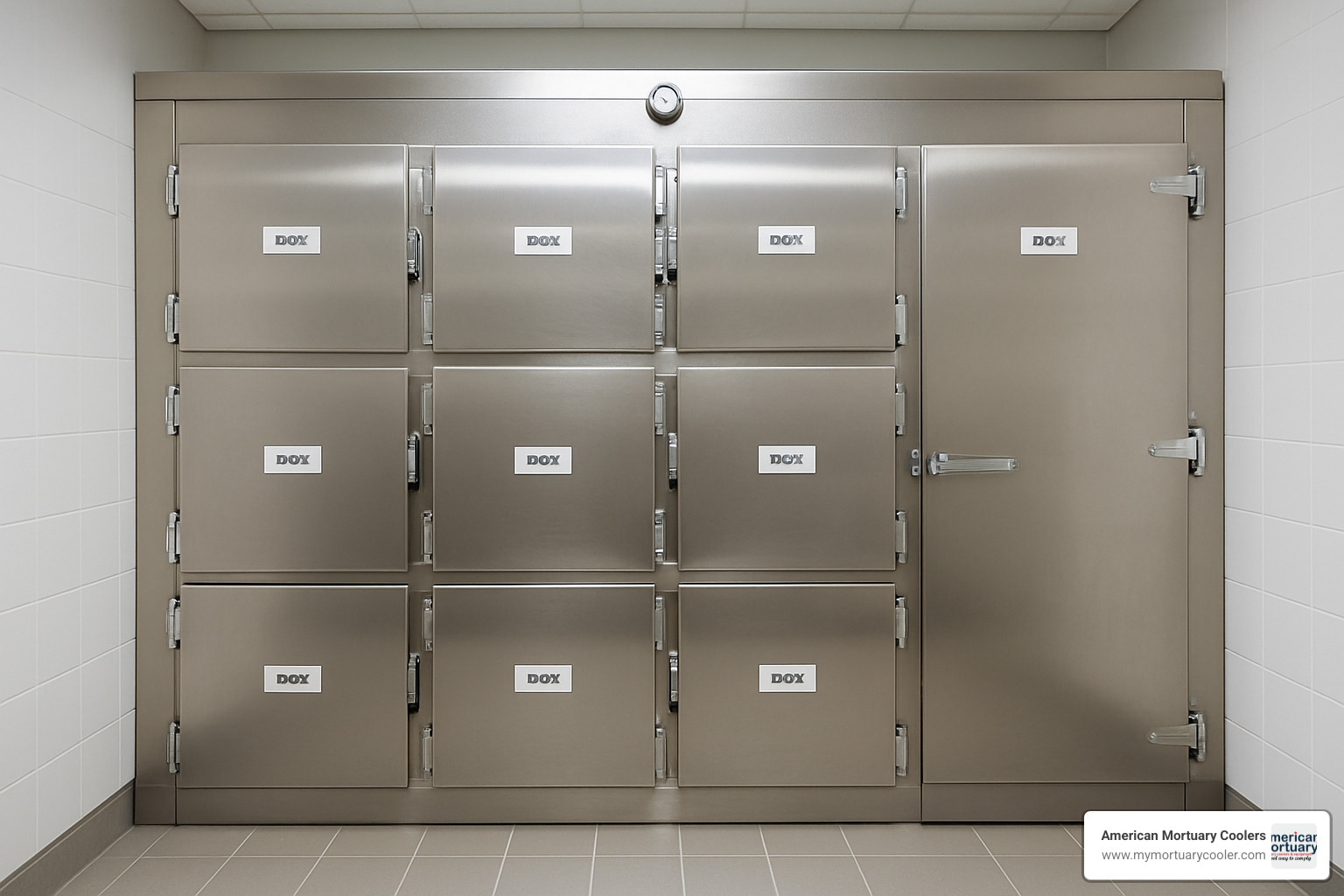
If you suspect a crematory isn't following proper procedures, you can report concerns directly to PLACE@illinoiscomptroller.gov - the email address the Illinois Comptroller's Office established specifically for these issues after the Heights Crematory investigation.
Checklist for Families Vetting a Crematory
Choosing a cremation provider shouldn't feel overwhelming, but it does require asking the right questions. Start by verifying the facility's current state license status - this basic step could have prevented many families from being affected by Heights Crematory's violations.
Request a tour of the crematory itself, not just the funeral home's front office. A reputable facility will be proud to show you their equipment and explain their processes. Pay special attention to their refrigeration and storage areas.
Ask about their documentation procedures and timeline for returning remains. How do they track bodies from intake through cremation? What identification methods do they use? When will you receive your loved one's ashes?
Be alert for red flags like reluctance to allow facility tours, broken or inadequate refrigeration equipment, or missing documentation. If a facility seems overcrowded, disorganized, or offers prices that seem too good to be true, trust your instincts and look elsewhere.
Alternatives and Next Steps for Chicago Heights Families
After the devastating closure of Heights Crematory in Chicago Heights, local families deserve to know they have trustworthy alternatives for cremation services. Several reputable funeral homes in the area maintain proper facilities and equipment - exactly what Heights Crematory failed to provide.
Direct cremation costs in the Chicago Heights area generally run between $1,725 and $2,275. While price matters, the Heights Crematory situation proves that the cheapest option isn't always the best value. Families should weigh cost against the facility's reputation, equipment quality, and compliance record with state regulations.
Understanding modern cremation equipment helps families make informed choices. The Cremation Systems: The Heart of Modern Farewells explains what proper cremation facilities should look like - knowledge that could have helped families avoid the Heights Crematory disaster.
Reporting Concerns or Suspected Misconduct
The Heights Crematory in Chicago Heights case shows that speaking up about problems actually works. When whistleblowers reported the violations, state regulators took swift action to protect families and shut down the facility permanently.
If you suspect crematory misconduct, don't wait - contact the Illinois State Comptroller's office at PLACE@illinoiscomptroller.gov. The Illinois Department of Financial and Professional Regulation also handles complaints about licensed facilities.
The Better Business Bureau tracks business practice complaints and can help other families avoid problematic facilities. For serious violations involving financial losses or emotional distress, consulting with legal counsel may be appropriate to explore civil action options.
The key lesson from Heights Crematory is that regulatory agencies have real power to act when they receive solid information. But they need industry professionals and concerned families to serve as their eyes and ears in identifying problems before they spiral out of control.
Frequently Asked Questions about Heights Crematory
What happens if my loved one's ashes were at Heights Crematory?
If your loved one's cremated remains were stored at Heights Crematory in Chicago Heights, they've been safely transferred to the Cook County Medical Examiner's Office. The good news is that 504 sets of cremated remains have been verified and are ready for families to retrieve.
Here's what you need to do: email MEOfamilyservices@cookcountyil.gov to schedule your appointment. Don't just show up - they require appointments and won't accept walk-ins. When you visit their office at 2121 W. Harrison St. in Chicago, bring a valid photo ID and be prepared to complete an Authorization for Release of Cremated Remains form.
The Medical Examiner's Office is open Monday through Friday from 7 a.m. to 3 p.m. They've worked with Illinois and Indiana vital records departments to verify each set of remains, so you can be confident you're receiving your loved one's ashes.
The staff understands this is an emotionally difficult process. They've acknowledged that retrieving remains under these circumstances "may cause emotional distress" and encourage families to seek support during this challenging time.
Can I still file a lawsuit against the owners?
Absolutely. Multiple families have already filed civil lawsuits against Heights Crematory in Chicago Heights and its owners, and you have every right to explore legal action if your family was harmed.
Common grounds for lawsuits include receiving the wrong cremated remains, emotional distress from learning your loved one was improperly stored, or finding that remains were mishandled or lost due to poor documentation. The facility's violations were so severe that State Comptroller Susana Mendoza permanently revoked their license - providing strong evidence of misconduct.
If you're considering legal action, consult with an attorney who specializes in funeral home malpractice. They can evaluate your specific situation and explain your options. The documented violations, whistleblower evidence, and state investigation findings create a solid foundation for potential claims.
That there may be time limits for filing lawsuits, so don't wait too long to seek legal advice if you believe your family was wronged.
How do Illinois regulators monitor crematories going forward?
The Heights Crematory in Chicago Heights case has fundamentally changed how Illinois monitors crematory operations. State Comptroller Susana Mendoza's office now has a dedicated email address - PLACE@illinoiscomptroller.gov - specifically for reporting concerns about crematory and funeral home practices.
This case proved that the consent order mechanism is an effective tool for enforcement. It allowed regulators to permanently shut down Heights Crematory without lengthy court proceedings, setting a powerful precedent for future violations.
Regular state inspections continue, but now there's heightened awareness of what to look for. Inspectors pay closer attention to refrigeration equipment, documentation practices, and storage conditions. They're also more vigilant about facilities that might try to conceal violations, like Heights did with their hidden trailer.
The Illinois Funeral Directors Association played a crucial role by providing whistleblower evidence, and they continue monitoring industry practices. This partnership between regulators and industry professionals creates multiple layers of oversight.
For families, this means better protection and faster response when problems arise. The regulatory tools are now in place to quickly address serious violations before they affect hundreds of families like the Heights Crematory situation did.
Conclusion
The story of Heights Crematory in Chicago Heights will be remembered as a turning point in how Illinois handles crematory oversight. When State Comptroller Susana Mendoza permanently shut down the facility in June 2025, she sent a clear message: treating human remains with dignity isn't negotiable.
For the hundreds of families caught in this nightmare, the path forward involves patience and healing. The Cook County Medical Examiner's Office continues working to reunite families with their loved ones' remains, though the emotional scars from this betrayal of trust will take much longer to heal.
The real lesson here goes beyond one bad facility. It's about the critical importance of proper equipment and professional standards in death care. When refrigeration systems fail and documentation disappears, it's not just a business problem - it's a human tragedy that affects grieving families at their most vulnerable moment.
We've spent years helping funeral homes and crematories across the country maintain the kind of reliable equipment that prevents these disasters. Proper mortuary refrigeration isn't just about meeting regulations - it's about honoring the sacred trust families place in us when they're facing their darkest hours.
The brave whistleblowers who exposed Heights Crematory proved that industry professionals have a responsibility to speak up when they see problems. Their courage saved countless other families from experiencing similar trauma.
Families now have more power than ever to protect themselves. They can demand facility tours, ask tough questions about equipment and procedures, and report concerns to PLACE@illinoiscomptroller.gov. The Heights case shows that regulators will act when they receive credible complaints.
For funeral directors and crematory operators, this case offers a sobering reminder about the consequences of cutting corners. Walk-in body refrigerators and proper cooling systems aren't expensive luxuries - they're essential investments in maintaining the trust that makes our industry possible.
The legacy of Heights Crematory in Chicago Heights should be a funeral industry that never again tolerates such failures. When we invest in proper equipment, maintain professional standards, and hold each other accountable, we honor not just the deceased but the families who trust us with their most precious memories.



















